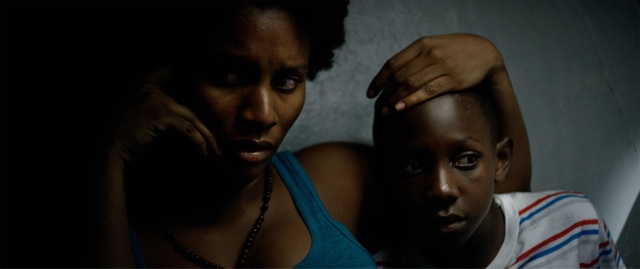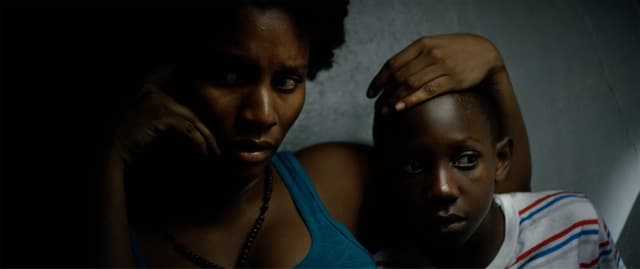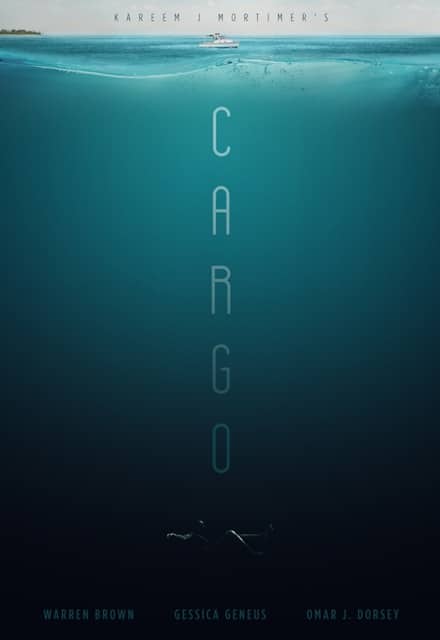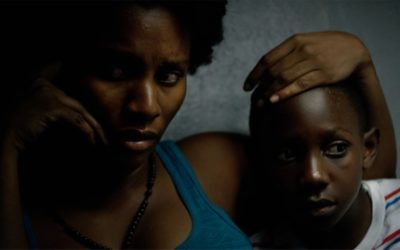
By Amanda Coulson
On October 18th and 19th, Best Ever Films Ltd. premiered Kareem Mortimer’s “Cargo,” positioned as the largest Bahamian film production ever on home soil, to two quite different audiences. The first a small, boutique event at The Island House (West End), populated largely by Lyford Cay and Old Fort residents and with a good percentage of ex-pats, and the second at a huge, glamorous event at Atlantis on Paradise Island. The latter, replete with red carpet strutting and attendant press and paparazzi, was overall a more local affair, though still with many international attendees, and graced by a wide range of supporters from many different Bahamian industries.

Still from “Cargo,” with feature film veteran Gessica Geneus (left) and newcomer Brian Diligence (right)
The film is stunning but harrowing; it deals with human smuggling, colourism and elitism, xenophobia and prejudice, shame and desperation; in doing so, it shines a light on the parts of our country we desperately try to forget about or, at least, make great efforts to keep as far away from our shiny touristic image as possible. At the end of each screening was a short Q&A session, with director Mortimer, producer Alexander Younis, lead actors Warren Brown (UK), Jimmy Jean-Louis (Haiti) and Omar J. Dorsey (USA). On the second night, they were also joined by many of the Bahamian cast, including Liam Burrows, Dion Johnson and young newcomer, Brian Diligence, whose performance as a young boy of Haitian descent, coping with life in a shanty town, while keeping up his excellent grades, but who is ultimately forced to make a traumatic journey that almost costs his life, was unforgettable in its poignancy.
Leslie Vanderpool, the founder and executive director of the Bahamas International Film Festival (BIFF) and an early supporter of Mortimer’s work since 2004, had this to say: “The collaboration put into the making of “Cargo” was a terrific ensemble from the acting to the cinematography; the story is an arduous topic that needs to be discussed regarding the passage that humans take to find freedom.”
Both audiences were extremely engaged, asking many questions, but the Atlantis audience certainly understood all the nuances of the script and performances and, despite the difficult subject matter, still found the humour in many of the recognizable scenes and characters, laughing heartily on several occasions, thereby relieving the overall tension.
As Mortimer commented after the event, “The amount of support that we received at the premiere of “Cargo” is definitely a highlight of my career. As a Bahamian artist, to have the work received in such a way at home gives us even greater hope for the future; to see people amazed by what they see on screen and then to know that the people who worked on creating those images are people they know, or can get to know, made the whole evening electric.”
Indeed, while other features, such as Maria Govan’s “Rain” (2008)—a one-million-dollar movie also shot in The Bahamas—have played a very important role in generating excitement necessary to build an industry, “Cargo”—due to its size, longevity and employment rate—took it to the next level. The film was shot in 32 days over 34 locations in Nassau, with a third of the film shot on open water. It employed Bahamians in key positions including, producers, location manager, casting, hair & makeup, locations, production design, catering and props, and out of 130 employees, over 80 were Bahamian. The feature also gave an opportunity for their big screen debut to the above-mentioned local actors and it was entirely developed, shot and also edited in Nassau—with its 1.5 million dollar budget raised largely at home—making it an 100% Bahamian developed and produced major feature film, which is something of which we can all be immensely proud.
Producer Alexander Younis, an Austrian of Egyptian descent but now based in The Bahamas, has over a decade of film experience and has chosen to work with Mortimer as he sees the growth potential here in the region. Of the evening’s proceedings, he added, “What a wonderful success for The Bahamas, its people and its film culture. We couldn’t really anticipate what to expect, as this was the first individual Bahamian Film Gala of its kind—outside of the film festival—but the Bahamian people exceeded them all and we could have been sold out twice! The overwhelmingly positive reactions and compliments, their expressed appreciation about the authenticity and originality of how a story of their own had been told, made me confident about a successful future for our film and our vision at Best Ever Film, within the Caribbean and the world.”

Film poster for “Cargo,” concept conceived by Best Ever Films, executed by Daniel Spatzek.
The name of Moritmer and Younis’ production company was inspired by Mortimer’s paternal great-grand parents, Winifred Gibson Mortimer and Ulric Mortimer Sr., a successful business owner and philanthropist. In 1928, he established his first business, “Best Ever Candy Kitchen” in Nassau, which is still in operation today. The candies the company produced were varied and diverse, but all were made with impeccable care and their popularity solidified the business as a cultural institution. Best Ever Film aims to continue in that fine Bahamian tradition by developing, producing and distributing films that will vary in genre but will be made with such passion and integrity as to make every production its best, making them competitive in the global market place.
Already, the company is doing well: “Children of God” (2009), Mortimer’s first feature film, traveled to more than 26 countries and, over the last 8 years, has been seen by over 100 million people. “Cargo,” meanwhile, though just out of the gate, is the first Bahamian film to be eligible for the Knight Competition and also won the Bahamian Icon award, as well as the Amnesty International Human Rights Prize for film in 2017.
Despite the overall elation and excitement, however, this is just a single film—and one that took seven years to make. One does not see films being shot on the corners every month—as one might in Toronto—and we do not have a major film sound stage or a wide variety of professional crews meaning, if a foreign company does come in to shoot, they will probably import much of the talent, both on-screen and off. Countries like France and Canada—but also smaller ones like Morocco—have large, trained professional crews on hand and, aside from marketing their countries as locations and offering incentives to shoot, these nations also make it a make the requirement with any foreign film company to hire a specific number of locals in key positions, as actors and other crew members.
Despite the extraordinary work of many Bahamians 365-days a year creating or promoting films, therefore, it would be hard to say that we have a bona fide “industry” as yet; we are certainly beyond infancy, but still in the adolescent phase and, while many have worked hard to lay strong foundations, we do need to continue to push forward, mature the emerging industry and build further.
Lavado Stubbs—founder of Conchboy Films and also a Bahamian Icon recipient—makes about 30 commercials a year (at home and internationally) and employs about 5-10 Bahamians on each job. He was in attendance at the premiere and commented that, “The creation of more grants that focus on film would really help the creative community with their projects. Funding drastically helps a project and many countries have or had grant systems in place that really helped build up their film industries. For example, the Canadian grant system MuchFact, produced music videos that, in turn, assisted upcoming Canadian film students to become world-class award-winning filmmakers. Also, film tourism is a huge industry around the world: New Zealand has benefited in many ways from the production of the “Lord of the Rings” franchise and I believe we could do the same for The Bahamas by creating incentives for more foreign filmmakers to produce films here, which would help the economy, providing jobs for local filmmakers on a consistent basis.”
Vanderpool stressed the importance of local support, stating: “The Bahamas International Film Festival has showcased Mortimer’s films since 2004, as it’s important to support the nascent filmmakers, such as Mortimer and Maria Govan. A part of Mortimer’s tenacity stems from the connectivity he has nurtured from the BIFF.”
Stubbs concluded by stating, “I think the future of the Bahamian film industry is bright. Filmmakers like Kareem Mortimer are opening up the doors for many Bahamian filmmakers to see that it is possible for a Bahamian to create a feature length film and tell amazing Bahamian stories,” while Younis added, “Bahamas: you have my commitment to continue our work with persistence, integrity and authenticity to reach an even greater audience than before!”
With such talent and drive displayed on-screen and off, in the persons of the evening’s main focus—Mortimer, Younis and their actors and crewmembers—as well as many of professionals in attendance, such as Stubbs and Vanderpool, it seems like The Bahamas is well-positioned to see a creative explosion in our local film scene in the coming years.

